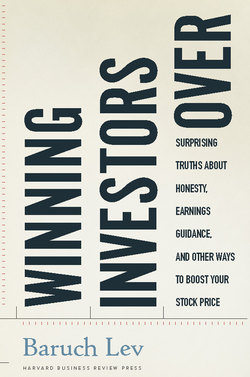Читать книгу Winning Investors Over - Baruch Lev - Страница 22
На сайте Литреса книга снята с продажи.
Other Communication Channels
ОглавлениеWhen investors attend shareholder meetings, read quarterly or annual reports, or participate in initial public offering (IPO) road shows, do they pay attention to the soft information imparted and to its tone, or just focus on the numbers? Is the narrative accompanying quantitative information cheap talk or does it convey a meaningful message?32 The latter, say Elizabeth Demers and Clara Vega, based on a study of twenty thousand quarterly earnings announcements made from 1998 to 2006, using linguistic algorithms.33 The researchers focus on two tone dimensions of the narrative: optimism (words of praise, satisfaction, inspiration) versus pessimism (blame, hardship, denial), and certainty expressions (tenacity, insistence) versus wavering (ambivalence, self-reference, variety). The results are instructive.
An optimistic managerial tone in earnings announcements positively affects investors' reaction (the stock price change around the announcement date) beyond the impact of the hard numbers.34 And this contagious effect of optimism is greater for high-tech firms, whose complex operations are not fully captured by a single number of earnings or sales, and companies with a lower quality of earnings (having large one-time and transitory items).35 Furthermore, the stock price impact of optimism is higher, the larger the number of analysts following the company and the more extensive the media coverage of the earnings announcement.Lesson: Don't hesitate to sound optimistic when warranted, particularly when the hard data like earnings or sales don't fully capture your company's performance and potential, as when earnings are depressed by large, yet promising R&D or brand-enhancing expenditures. This is important because lawyers frequently caution managers that optimism enhances exposure to litigation. Yet optimism has its rewards, as documented by Demers and Vega (optimistic persons also live longer, say researchers). But beware of baseless hype, which definitely attracts litigation. Optimism is based on facts and positive documented developments, such as a new major contract, a recent sales pickup, or a successful drug test, whereas hype is an empty ballyhoo. Recall that financial analysts and reporters will verify your optimism later on against subsequent developments, enabling them to distinguish optimism from hype.
Demers and Vega also report that a wavering, ambivalent tone (frequent use of maybe, approximately, uncertainty) is contagious too; it increases the volatility of the stock price, a reflection of investors' uncertainty.Lesson: Shielding yourself with vagueness and equivocation, which so often characterizes managerial communications, exacts a price in increased investor uncertainty and likely lower stock prices.36
